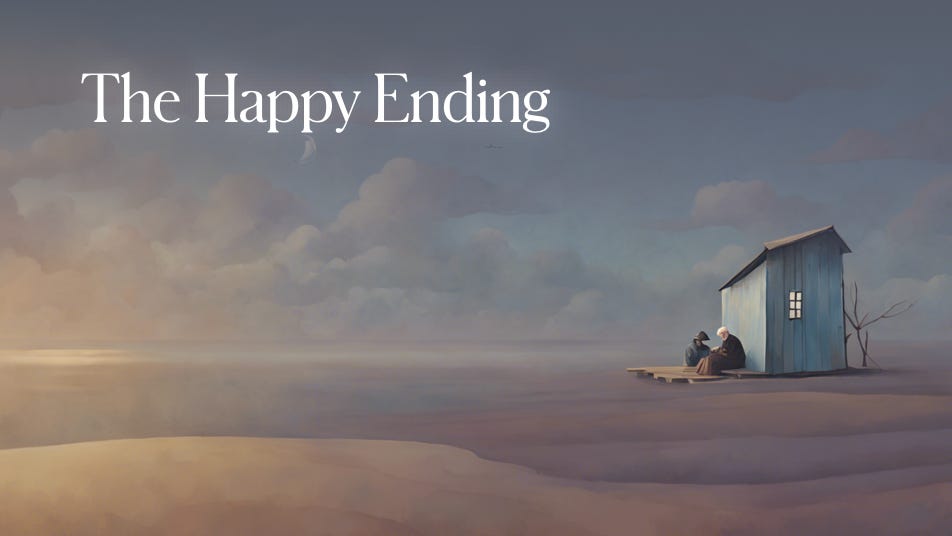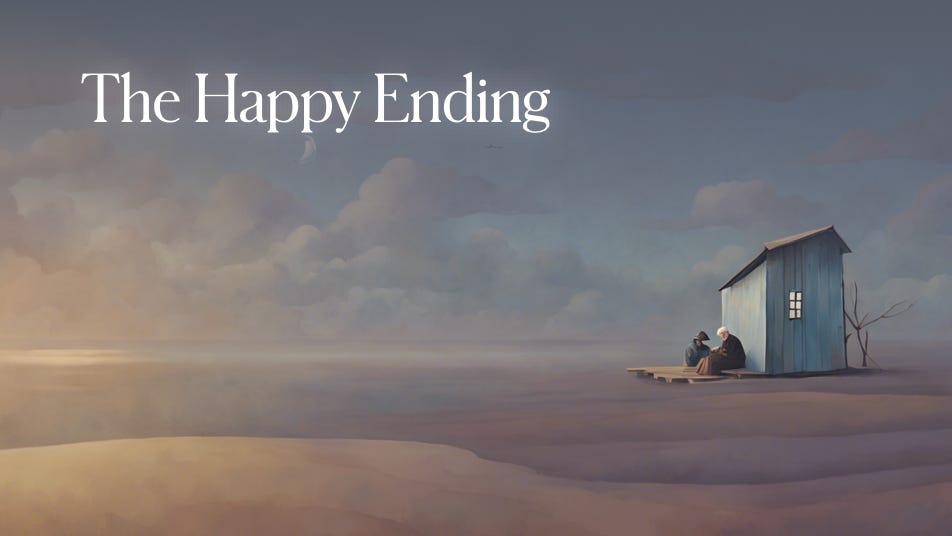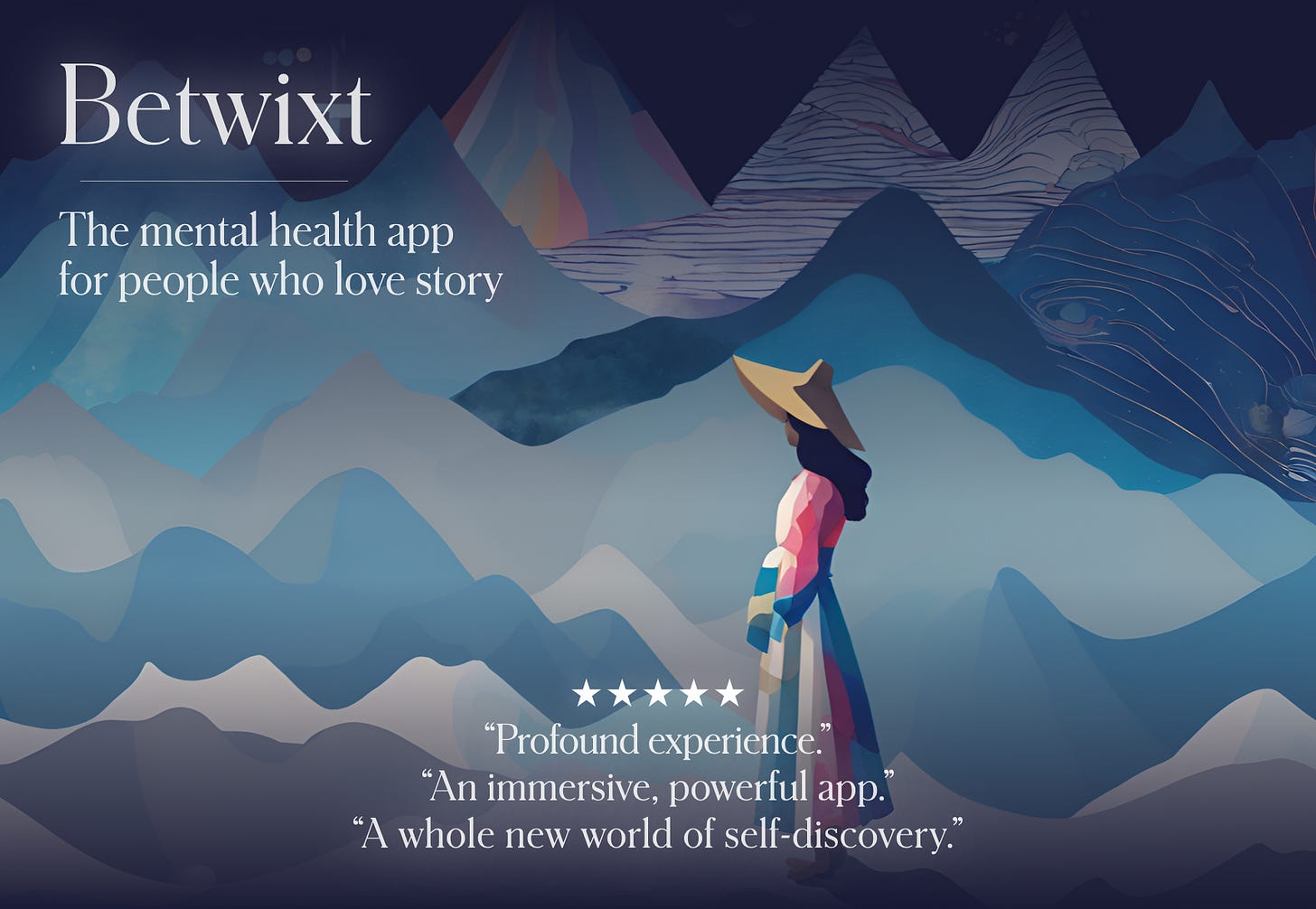A better way to think about the search for happiness
This hypnotic story will change your view on life, love and fortune
I'm going to tell you a story, which, as a feminist, used to infuriate me. But not anymore.
Enter The Fisherman and his Wife, a fairytale best known as one of the Grimm brothers' stories.
Once upon a time, in a humble little shack by the sea, there lived an old fisherman and his wife. Day after day, the fisherman pulled on his oilskins and sea boots, sailed out in a little boat, cast his net into the water, and… caught nothing. Barely enough to scrape by.
But then, one day, something extraordinary happened. Far out at sea, the fisherman hauled up his net to find a huge flounder, scales shimmering in the sunlight. And he thought, "Finally, we'll be able to eat like kings." But as he lifted the flounder into the boat, it spoke. "Please don't kill me," it said, "I'm no ordinary fish, but an enchanted prince. How will it help you to kill me? I would not taste good to you. Put me back into the water and let me swim. If you spare my life, I'll grant you a wish."
The fisherman, with a kind heart and simple needs, said no, he needed nothing from this miraculous fish. He set it free without a second thought, and returned empty-handed to the little shack to tell his wife the story. But she wasn't happy. "What were you thinking?" she said. "We have nothing. This place is falling down around our ears. Go back out there right now, find that fish and ask it for a cottage."
The fisherman looked at his wife, who seemed empty and discontent. He loved her, so he sighed and pulled on his wet oilskins and sea boots again, trudged back out to the boat and sailed to the spot where he found the fish. "Flounder, flounder in the sea!" he cried. "My wife, my wife Ilsebill, wants not, wants not what I will." The fish then popped up on a little wave and said "Well, what does she want?"
The fisherman explained that they lived in a rundown shack and that his wife wanted a nice cottage instead. The flounder listened intently and then simply said, "Go home, old man. It is already done."
And, sure enough, when he docked his boat and looked up the little path to where the shack once was, he saw that it had been transformed into a beautiful stone cottage with a pretty front garden, a kitchen and a bedroom, a parlour and a vegetable patch with a chicken coop. The old man thought, "This is perfect. Now I can rest."
But his wife wasn't satisfied. "I want more," she said. "Go back and ask that fish for a castle." Incredulous, the old man stared at his wife. "But you have what you wanted," he said. "Why is it not enough?" The wife, though, insisted she needed more. So the fisherman, begrudgingly, turned and went back to the boat and sailed far out into the ocean. "Flounder, flounder in the sea! My wife, my wife Ilsebill, wants not, wants not what I will". And once again, after making his request for a castle, the flounder simply said, "Go home, old man. It's already done."
And it was. The fisherman arrived home to a glorious castle with turrets, a portcullis, battlements and a glistening mote surrounding it all. But as the days went by, his wife only ever wanted more. As he repeatedly traipsed out to sea to find the flounder, their home grew from a cottage to a castle, from a castle to a kingdom, from a kingdom to an empire. With each request, the flounder simply responded, "Go home, old man. It's already done."
Until, finally, the wife demanded to be made the ruler of the sun and the moon. This time, when the fisherman left their ostentatious palace, the waters of the ocean had grown dark and stormy, with great black waves as high as church towers and mountains, all capped with crowns of white foam. The flounder appeared at the top of one of these waves, waiting for the next demand. "My wife wants to be God," the fisherman said. But the flounder, this time, only replied "Go home, old man" and then disappeared down into the depths of the pitch black water.
When he returned home that night, empty-handed once again, the fisherman found his wife sitting outside their old rundown little shack, rocking in her chair and peeling potatoes. So he sat down next to her without a word, and they are still sitting there even today.
The forgotten message of the fairytale
Like so many of the fairytales we hear as children, The Fisherman and his Wife is usually told as a cautionary tale, warning of the dangers of hubris and unchecked ambition, with just a hint of a "silly nagging woman" vibe about it. And on the face of things, it does seem as if this story ends in punishment and misery for the overreaching wife. But that's not necessarily the case. Here's a different – and in my opinion much, much better – reading of this story's meaning than the more obvious, literal take. I hope it makes you feel as warm, tingly and optimistic as it did me.
Before we break down the meaning of the various symbols in this story, I'd like you to bear in mind that in terms of Jungian analysis of myths, fairy tales and dreams, every character and element of the story is thought to represent an aspect of one’s psyche, as opposed to being a story about real, external beings. You can think of it a little like a dramatised internal conflict or other interaction. And as you'll see, this perspective can make a world of difference.
Let's start with the fisherman. When viewed through this lens, the fisherman can be understood as a kind of tired, impotent version of the King archetype, which represents the dominant consciousness or current version of self. It's what we're usually talking about when we use the word "I".
For the purpose of this discussion, we can think of the fisherman as the voice of reason – the level, logical part of the personality that we like to think is in control, but if we're honest with ourselves, it rarely is. It's the part of the self that says, "I'm never drinking again" when we wake up with a hangover.
Here, the fisherman wants to be satisfied with what his family has, and he can't understand his wife's demands, but he doesn't really call the shots. So he does what she asks of him.
The fisherman's home and wife combined represent the insatiable ego and the drive for more. In archetypal symbology, the house or home is often considered to represent the ego – a structured system that helps us make sense of our experience and an externalised extension of our identity, reflecting tastes, lifestyle and status. Like our clothes, the home is linked to the concept of Persona: the version of self we show to the world.
And living in the fisherman's home, of course, is the wife. Positioned within the confines of the ego, the wife is the manifestation of emotion in this little story. In contrast to the fisherman's somewhat passive, logical, reason-based thought, she symbolises wild and unreasonable feeling (I mean that literally – you can't reason with emotion).
So, the wife is the shadow aspect of the human psyche that wants and needs and grasps for more, always seeking something that it believes will bring peace, satisfaction, safety, comfort, whatever. In the story, the wife thinks she needs more wealth, power and status – more and more control – until she takes her thirst to the ultimate level and asks to be God.
In the Grimm Brothers version of this story, she doesn't just ask for a castle, a kingdom and an empire. She asks to be King, then to be Pope (which was a grander desire even than king in the middle ages) before asking to be God. And while, as modern humans, we might not often (or at all) wish to be Pope, I think we all know what it's like to have these cravings for control. And when we do, those cravings signal a deeper personal need. Sometimes it's hidden, even to us, but because that deeper longing is the real need, the things we project it onto – riches, success, qualification, beauty – never quench our thirst.
What does the emotional self truly long for?
So the real question posed by this story is this: what does the fisherman's wife – the emotional self – truly want? We'll come back to that question in just a moment. First, let's quickly cover the other symbols.
The ocean archetypally represents the vast potential of the unconscious mind – wild and deep and unknowable, but brimming with magic and opportunity. The fisherman, as the conscious aspect of Self, wants to be connected to these waters of the unconscious. He repeatedly sails out to sea in the hope of providing nourishment for himself and his wife, but he returns empty-handed every time, because the conscious and unconscious mind just don't have a very direct connection. They speak different languages.
Similarly, the flounder can be understood as a personification of the resourceful unconscious mind and its ability to make things happen. Just as the fisherman pulls the flounder from the depths of the ocean, the wishes that are granted represent desires and needs – as well as the solutions to those wishes – emerging from the unconscious.
So far, so good. But here's where it gets interesting.
After the wife's final wish to be God, and after everything seemingly reverts to how it was right at the beginning, why does the ego's craving stop? Every other time the fisherman returns home, no matter how grand the change, the wife makes her new demand immediately and forcefully. Why not this time?
If we read this tale through the lens of conscious, rational, literal thought – which is what we tend to do – then it looks like the flounder runs out of patience and punishes the wife for overreaching by stripping her of all the comforts and riches she's acquired. And if that were the case, when she doesn't kick up a fuss like usual, then it must mean that the ego has finally seen sense, decided to stop issuing unrealistic demands and to instead make do with what it has.
Logic and emotion: an ongoing battle
This is what we all hope will happen when we try to logically talk ourselves out of our needs. We tell ourselves not to be so unreasonable, and we hope that our emotions will then just… fall in line.
The tale seems to echo and validate this approach. It seems to tell us not to get too big for our (sea) boots, to stay small, want nothing, and just be happy with what we've got, because if we ask for more, eventually, we'll be served our just desserts.
But, I think all of us know from first-hand experience, that reasoning with our emotions doesn't really get us anywhere. You can't logic yourself out of pain or loss, anxiety or depression. You can't reason away your deepest needs and desires. It simply doesn't work. And anyway, on his own, the fisherman wasn't enough; reason could not catch the fish they so desperately needed in order to survive. Reason always came back empty- handed.
Flawed logic
It simply makes no sense to assume that this story ends with the wife realising the error of her ways, settling for the shack and the potatoes, and never asking anything else again. So, what changed after her final wish to be able to control the sun and the stars, to have the power of God?
In myth after myth, the moment a mortal ascends to the ranks of god or goddess can be understood as the ultimate symbol of psychological integration. Godliness or holiness = wholeness. This is achieved when the lost, repressed aspects of the psyche are reintegrated, when masculine and feminine are united, when thought and feeling are aligned.
The "unifying force of love" virtually always plays a part in the archetypal happy ending. To become God is to become whole, and to transcend the concerns of the mortal world. To achieve love, union and completeness. To achieve enlightenment.
So here's what I'm wondering: was that last wish rejected on the grounds of being too much? Or was it actually granted?
Let me know what you think.
Thank you for reading!
We’re Hazel (ex boxer, therapist and author) and Ellie (ex psychology science writer). We left our jobs to build an interactive narrative app for self-awareness and emotion regulation (Betwixt), which you can try on Android here and on iOS here.















What a brilliant and thought-eliciting piece. Thank you Hazel. I believe her wish was granted.
Similar story to The Alchemist and Acres of Diamonds?
The more things change, the more they remain the same??